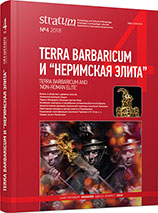Эллинская милиция Балканской Греции (вторая половина II в. до н. э. — III в. н. э.)
Greek Militia in Balkan Greece in the Second Half of the 2nd c. BC to the 3rd c. AD
Author(s): Alexander K. NefedkinSubject(s): History, Military history, Social history, Ancient World
Published by: Издательский дом Stratum, Университет «Высшая антропологическая школа»
Keywords: Balkans; Roman epoch; ancient Greeks; polis; warfare;militia;
Summary/Abstract: In the Roman Republican period (after 146 BC), the Greeks continued to maintain their military state institutions: commandment, epheboea, and mandatory military service. The Romans limited the recruitment of mercenaries, so their role decreasing, the role of civil militia increased. Poleis needed guardians and police. During the Roman rule, field battles were an element of the “great war” between Rome and other states or civil wars, but they were rare in “small wars”, i.e. in conflicts between cities. Usually, “small wars” were the attacks during sieges and naval battles. Greek militia were called in during war times in Greece: I Mithridatic war (89—85 BC), Roman civil wars (48—31 BC). In non-military time, the Romans did not appreciate the Greeks as fighters, recruiting the belligerent inhabitants of the Northern Balkans (Macedonia, Epirus) to their legions and auxiliary cohorts.
Journal: Stratum plus. Археология и культурная антропология
- Issue Year: 2018
- Issue No: 4
- Page Range: 317-326
- Page Count: 10
- Language: Russian
- Content File-PDF

